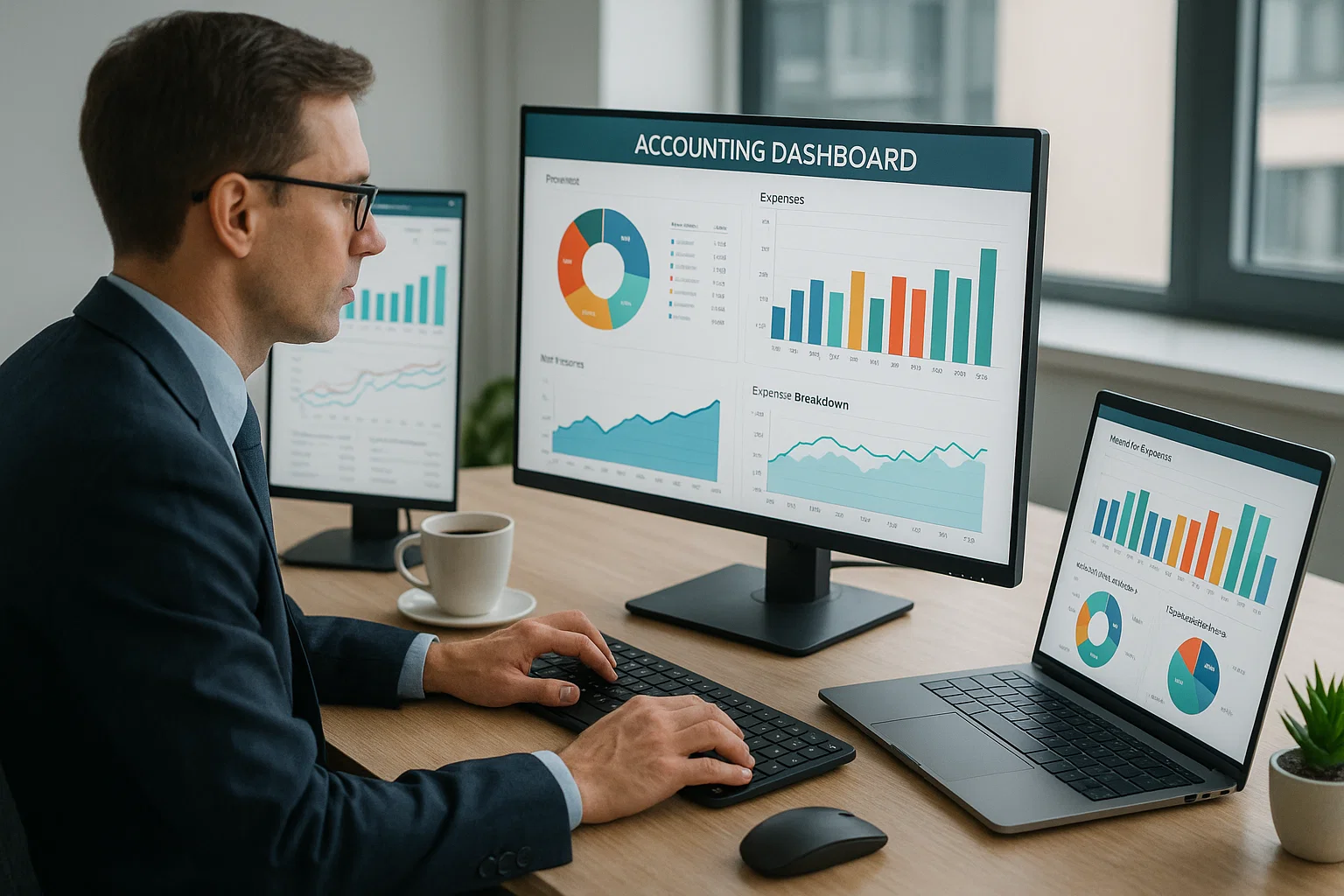

Finding the right accounting software feels like searching for a needle in a digital haystack. With hundreds of options available and new features being added constantly, professionals and businesses struggle to identify which solution best fits their unique needs. Choosing incorrectly can lead to costly inefficiencies, compliance issues, and even financial reporting errors that impact business decisions.
This comprehensive guide breaks down the essential types of accounting software available today, helping you understand which solutions align with specific industries and how mastering these tools can significantly advance your accounting career in the UAE and beyond.

General accounting software forms the backbone of financial management for businesses of all sizes. These versatile solutions handle core accounting functions including:
QuickBooks remains one of the most widely used accounting solutions globally, particularly for small to medium-sized businesses. Its intuitive interface and comprehensive functionality make it accessible even for those with limited accounting knowledge.
QuickBooks is a must-have skill for modern accountants in today’s job market. The software offers various versions including:
Learning QuickBooks can significantly enhance your employability in the UAE market. Alifbyte’s QuickBooks training provides comprehensive hands-on experience with this essential tool.
Sage 50 offers robust accounting capabilities with advanced inventory management and job costing features. It’s particularly popular among construction, manufacturing, and distribution businesses.
While powerful, Sage 50 users often encounter technical challenges. Understanding common challenges in Sage 50 and how to overcome them is essential for mastering this software.
When comparing options, many professionals debate Sage vs QuickBooks: which software is better for their specific needs. Both have distinct advantages depending on your industry and requirements.
Alifbyte’s Sage 50 course provides in-depth training for professionals looking to master this powerful accounting tool.
Xero has gained significant market share with its cloud-based accounting platform that emphasizes collaboration and accessibility. Its strengths include:

While general accounting software works for many businesses, certain industries have specialized requirements that demand purpose-built solutions.
Manufacturing businesses require accounting software that handles:
Solutions like IQMS, Fishbowl, and JobBOSS address these specialized needs.
Healthcare organizations face unique accounting challenges including:
Career opportunities in medical coding have expanded significantly with the growth of healthcare IT systems. The medical coder salary in UAE reflects the high demand for these specialized skills.
Construction accounting requires:
Solutions like Jonas Construction, Foundation Software, and Viewpoint specifically address these industry needs.

For larger organizations, accounting functions often integrate within comprehensive ERP systems that manage all aspects of business operations.
SAP offers extensive financial management capabilities within its broader ERP framework. Its accounting modules include:
NetSuite provides cloud-based ERP with strong accounting functionality, particularly suited for businesses with:
Microsoft’s ERP solution integrates seamlessly with other Microsoft products while offering robust accounting capabilities, including:

Tax compliance is a critical accounting function, especially in regions with complex tax regulations like the UAE.
With the introduction of VAT and corporate tax in the UAE, specialized tax software has become essential for businesses operating in the region.
VAT training in the UAE provides professionals with the knowledge needed to navigate the UAE’s tax system effectively.
For businesses adapting to recent regulations, corporate tax training has become increasingly important. Alifbyte’s beginner’s guide to corporate tax training offers an accessible introduction to this complex topic.

Payroll software automates the calculation of employee salaries, tax withholdings, and benefits deductions.
Modern payroll solutions offer:
This category includes standalone solutions like Gusto and ADP, as well as payroll modules within larger accounting systems.

Expense management software streamlines the process of tracking, approving, and reimbursing employee expenses.
Popular options include Expensify, Concur, and Zoho Expense.

For service-based businesses, dedicated billing and invoicing software can offer more specialized functionality than general accounting packages.
Solutions in this category include FreshBooks, Invoice2go, and Zoho Invoice.

Project-based businesses need accounting tools that track finances at both the project and organizational levels.
Using MS Excel for accounting purposes remains common for smaller project-based businesses. For more advanced needs, learning advanced Excel skills can significantly enhance your project accounting capabilities.
Power Query has become increasingly important for data manipulation in project accounting. Understanding career opportunities in Power Query and its usefulness for data analysis can give accounting professionals a competitive edge.

Non-profit organizations, government agencies, and educational institutions require fund accounting software that tracks resources according to donor or grant restrictions.
Popular fund accounting solutions include Blackbaud Financial Edge, MIP Fund Accounting, and Sage Intacct.

Small businesses have unique accounting needs that balance functionality with affordability and ease of use.
Why non-accountants should learn basic accounting explains the importance of accounting literacy for all business professionals. For small business owners and staff, understanding basic accounting principles is essential for making informed decisions.
Small businesses in the UAE often benefit from accounting for non-accounting professionals training.

Selecting the appropriate accounting software requires careful consideration of several factors:
Different industries have unique accounting needs:
Choose software that can scale with your business to avoid painful migrations later.
Ensure the software meets regulatory requirements for your:
Modern accounting systems should integrate with:

To thrive in today’s accounting landscape, professionals need both traditional accounting knowledge and technological proficiency.
The accountant salary in Dubai guide demonstrates how software proficiency directly impacts earning potential. For those with advanced certifications, the salary of ACCA in Dubai shows the financial benefits of specialized knowledge.
Understanding how to start an accounting career in UAE and the qualifications required for accountants in UAE is essential for professionals entering the market.
For aspiring specialists, how to become a certified accounting specialist provides a roadmap to career advancement.
The top accounting skills to excel in finance career increasingly include both traditional accounting knowledge and software proficiency.
QuickBooks and Sage 50 are among the most widely used accounting software in the UAE, with Tally and Zoho Books also having significant market share. Enterprise businesses often implement SAP or Oracle solutions.
While general accounting software works for many businesses, industries with specialized requirements like construction, healthcare, manufacturing, and non-profits benefit significantly from industry-specific solutions that address their unique accounting challenges.
Accounting software costs vary widely, from free basic versions to thousands of dirhams annually for enterprise solutions. Cloud-based options typically use subscription models ranging from AED 50-500 per month for small businesses, while on-premises enterprise solutions can cost tens of thousands.
The transition requires planning and training, but is manageable with proper preparation. Manual vs. computerized accounting training can help bridge this gap and make the transition smoother.
Reputable cloud accounting providers implement enterprise-grade security measures that often exceed what small businesses could implement internally. Look for solutions with encryption, multi-factor authentication, regular security audits, and compliance certifications.
Wave Accounting (free), QuickBooks Self-Employed, and FreshBooks are popular choices for freelancers due to their simplicity, affordability, and focus on core needs like invoicing, expense tracking, and basic reporting.
Cloud-based solutions update automatically. For desktop software, it’s advisable to update at least annually for tax compliance changes, security patches, and new features. Major upgrades should align with your business cycle to minimize disruption.
Most modern accounting solutions support multiple users with role-based permissions. Cloud-based options typically excel at this, while desktop solutions may require additional licenses or server installations.
Key integrations include banking connections, payment processors, CRM systems, e-commerce platforms, payroll services, and industry-specific tools relevant to your business operations.
Basic proficiency typically takes 2-4 weeks of regular use. Full mastery, including advanced features, reporting, and troubleshooting, may take 3-6 months. Professional training through providers like Alifbyte can significantly accelerate this learning curve.
Accounting software has evolved from simple bookkeeping tools to comprehensive financial management systems. Understanding the different types of accounting software available and their appropriate applications is essential for businesses and accounting professionals alike.
In the UAE’s competitive job market, software proficiency significantly impacts career prospects and earning potential. By investing in the right training and certifications, accounting professionals can position themselves as valuable assets to any organization.
Whether you’re looking to advance your accounting career or find the right financial management solution for your business, Alifbyte Education offers comprehensive accounting courses and software training to help you achieve your goals.
The future of accounting lies at the intersection of financial expertise and technological proficiency. By mastering the appropriate accounting software for your industry and needs, you’ll be well-positioned for success in this evolving landscape.
